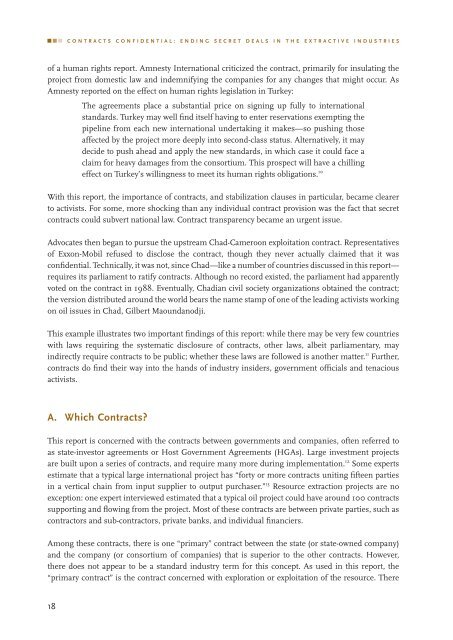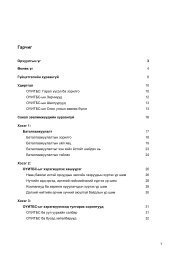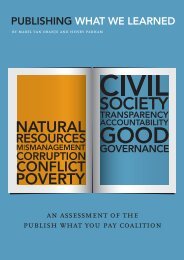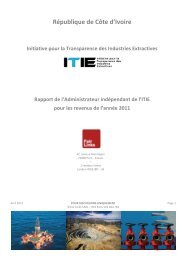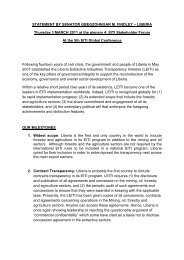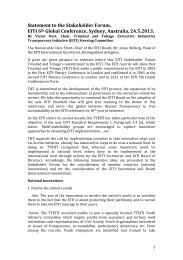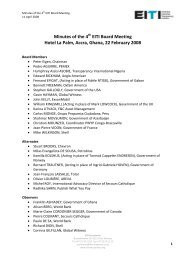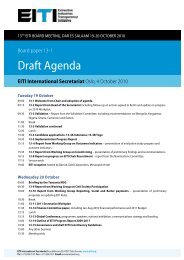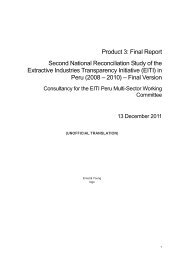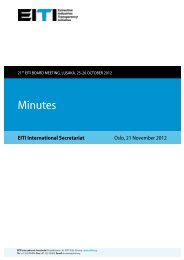CONTRACTS CONFIDENTIAL: - Good Law and Practice
CONTRACTS CONFIDENTIAL: - Good Law and Practice
CONTRACTS CONFIDENTIAL: - Good Law and Practice
You also want an ePaper? Increase the reach of your titles
YUMPU automatically turns print PDFs into web optimized ePapers that Google loves.
18<br />
<strong>CONTRACTS</strong> <strong>CONFIDENTIAL</strong>: ENDING SECRET DEALS IN THE EXTRACTIVE INDUSTRIES<br />
of a human rights report. Amnesty International criticized the contract, primarily for insulating the<br />
project from domestic law <strong>and</strong> indemnifying the companies for any changes that might occur. As<br />
Amnesty reported on the effect on human rights legislation in Turkey:<br />
The agreements place a substantial price on signing up fully to international<br />
st<strong>and</strong>ards. Turkey may well find itself having to enter reservations exempting the<br />
pipeline from each new international undertaking it makes—so pushing those<br />
affected by the project more deeply into second-class status. Alternatively, it may<br />
decide to push ahead <strong>and</strong> apply the new st<strong>and</strong>ards, in which case it could face a<br />
claim for heavy damages from the consortium. This prospect will have a chilling<br />
effect on Turkey’s willingness to meet its human rights obligations. 10<br />
With this report, the importance of contracts, <strong>and</strong> stabilization clauses in particular, became clearer<br />
to activists. For some, more shocking than any individual contract provision was the fact that secret<br />
contracts could subvert national law. Contract transparency became an urgent issue.<br />
Advocates then began to pursue the upstream Chad-Cameroon exploitation contract. Representatives<br />
of Exxon-Mobil refused to disclose the contract, though they never actually claimed that it was<br />
confidential. Technically, it was not, since Chad—like a number of countries discussed in this report—<br />
requires its parliament to ratify contracts. Although no record existed, the parliament had apparently<br />
voted on the contract in 1988. Eventually, Chadian civil society organizations obtained the contract;<br />
the version distributed around the world bears the name stamp of one of the leading activists working<br />
on oil issues in Chad, Gilbert Maoundanodji.<br />
This example illustrates two important findings of this report: while there may be very few countries<br />
with laws requiring the systematic disclosure of contracts, other laws, albeit parliamentary, may<br />
indirectly require contracts to be public; whether these laws are followed is another matter. 11 Further,<br />
contracts do find their way into the h<strong>and</strong>s of industry insiders, government officials <strong>and</strong> tenacious<br />
activists.<br />
A. Which Contracts?<br />
This report is concerned with the contracts between governments <strong>and</strong> companies, often referred to<br />
as state-investor agreements or Host Government Agreements (HGAs). Large investment projects<br />
are built upon a series of contracts, <strong>and</strong> require many more during implementation. 12 Some experts<br />
estimate that a typical large international project has “forty or more contracts uniting fifteen parties<br />
in a vertical chain from input supplier to output purchaser.” 13 Resource extraction projects are no<br />
exception: one expert interviewed estimated that a typical oil project could have around 100 contracts<br />
supporting <strong>and</strong> flowing from the project. Most of these contracts are between private parties, such as<br />
contractors <strong>and</strong> sub-contractors, private banks, <strong>and</strong> individual financiers.<br />
Among these contracts, there is one “primary” contract between the state (or state-owned company)<br />
<strong>and</strong> the company (or consortium of companies) that is superior to the other contracts. However,<br />
there does not appear to be a st<strong>and</strong>ard industry term for this concept. As used in this report, the<br />
“primary contract” is the contract concerned with exploration or exploitation of the resource. There


